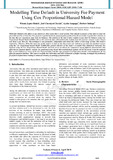Modelling Time Default in University Fee Payment Using Cox Proportional Hazard Model

View/
Date
2019-04Author
Rotich, W. J.
Chelule, J. K.
Ayubu, Anapapa O.
Imboga, H.
Metadata
Show full item recordAbstract
Default is the failure to pay interest or other money that is owed on time. Time default is amount of time taken to clear the given debt past the set time line. Fee payment is guided by the fee payment policy produced by all universities to guide their students on the time they are expected to clear their fee balances. The analysis of the time it takes students to pay their fee balances using Cox Proportional Hazard Model (CPHD) will use the university data collected from the students from the previous semester on how long it took them to pay their fee. The technique is non parametric, independent and robust thus allows a wide range of data. This study is inspired by (Mariusz, 2016).The main aim of this study is to find out the time it takes for students to pay their fee and their reasons using the Cox Proportional hazard Model (CPHD).The general objective of this study is to model Time Default in University Fee Payment using the Cox Proportional Hazard Model. Survival curves are drawn for comparison among different characteristics that affect the fee payment default. Analysis was performed using R and other mathematical modules will be discussed. From the analysed data several students are aware of the Fee Payment Policy and that Age_group,level of Education, Gender, and Employment do not affect fee payment timelines. This report is usefulto the Universities and other institutions of higher learning, to mitigate the problem of fee payment default hence leading to enhanced normalcy in running of the institution
URI
https://www.ijsr.net/get_abstract.php?paper_id=ART20197209https://www.semanticscholar.org/paper/Modelling-Time-Default-in-University-Fee-Payment-Rotich-Chelule/fbca18bbf71364581fc706ee8d9572ef403f1878
http://hdl.handle.net/123456789/4615
Collections
- Journal Articles (PAS) [273]
